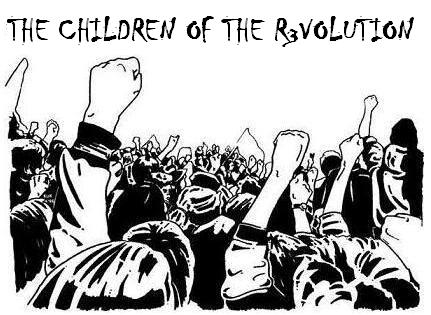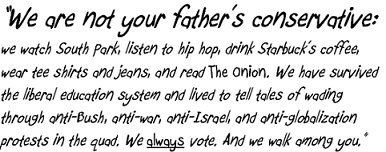 You, the American tax payer, should be watching with concern this week as Congress debates the president’s proposed “Wall Street Bailout,” which would offer up to $700 billion of your money to buy up distressed (not failed) mortgages. Unfortunately, this issue has become so murky due to some of the economic complexities that most Americans are watching with a befuddled helplessness rather than the more appropriate righteous outrage. But when you kick away the five-dollar terminology cluttering up this crisis, it once again comes down to the quintessential American debate: the size and role of government.
You, the American tax payer, should be watching with concern this week as Congress debates the president’s proposed “Wall Street Bailout,” which would offer up to $700 billion of your money to buy up distressed (not failed) mortgages. Unfortunately, this issue has become so murky due to some of the economic complexities that most Americans are watching with a befuddled helplessness rather than the more appropriate righteous outrage. But when you kick away the five-dollar terminology cluttering up this crisis, it once again comes down to the quintessential American debate: the size and role of government.
Let’s go back to the beginning. Contemporary political rhetoric paints this disaster as a function of ravenous Wall Street greed and a “Wild West” policy of deregulation in Washington. Nothing could be further from the truth. This financial implosion is a direct result of too much meddling in Washington, specifically Congressional mandates that advance a social agenda. Fannie Mae and Freddie Mac, which should be names that live in infamy, were the plaything of Congress for decades and are the symbol of federal mismanagement. Congressional Democrats literally used Fannie Mae and Freddie Mac as a social experiment, offering loans to high-risk candidates in the interest of providing housing to low-income Americans. Unfortunately, regular mortgage companies saw a bad example being set and, moreover, were forced to follow suit in order to remain competitive. Seeing signs of economic destabilization, the Bush administration attempted several times to force more oversight of the overseers, but were rebuffed repeatedly by Fannie Mae and Freddie Mac’s Democratic champions. In answer to one such attempt as early as 2003 to reform the government-owned mortgage giants, Democrat Barney Frank said, "These two entities -- Fannie Mae and Freddie Mac -- are not facing any kind of financial crisis."
I could go on and on about what a fiasco Fannie and Freddie represent, pointing, for instance, to the top five recipients of campaign contributions from these now defunct government corporations: Senator Christopher Dodd (D – CT), Senator John Kerry (D – MA), Senator Barack Obama (D – IL), Senator Hillary Clinton (D – NY), and Senator Paul Kanjorski (D – PA). But the important take-away is that these two institutions represent the root of our current economic crisis, and that should at least tell us one thing: if government meddling got us into this mess, government meddling will NOT get us out. But now President Bush is trying to ram through a gargantuan piece of legislation that will expand government authority and concentrate it in the hands of a single bureaucrat, Treasury Secretary Henry Paulson. And the two Senators chasing Bush’s job, particularly Barack Obama, are laughably blaming an out-of-control Wall Street and advocating even further federal regulation of private enterprise.
Whether anyone is willing to talk about it or not, we're slipping further and further into socialism with each new financial crisis that Washington is promising to save us from. They've set our house on fire and are asking to borrow our bucket to help put it out. They have rapidly nationalized major financial institutions and are clamoring to acquire even more substantial private interests. And this is just the Republicans. The Democrats, who have been dreaming of an opportunity like this for decades, are astonishingly criticising the administration for not taking its nationalization policy even further as Congress debates the $700 billion bailout proposal, demanding salary caps for CEOs and equal housing amendments be included before passage. This is absolute madness.
But whether or not this “Bailout” legislation is passed through Congress like a hot potato, this economic disaster is instructive for the American tax payer. For God's sake, the government does not know how to run a business, particularly your business. And the time-honored federal axiom of throwing more money at the problem should elicit angry howls from all of us, because our parents were promised that the pocket-picking would stop with their generation. At some point we need to slap the government's hand and take its toys away if it won't play nice, or we'll end up right back here in 2018.







2 comments:
To offer an alternative perspective:
Fannie and Freddie are issues, yes, but we cannot allow the indignant rhetoric of Red and Blue to muddle the real issue at work here.
The real crisis here has been the lack of regulation beyond the reach of the government, specifically, from the SEC. The SEC is chartered by the congress to act as an independent oversight body regulating the behavior of the secondary markets. It has failed.
The real curse was not Fannie and Freddie, they just underwrote loans, and have continued to have decent, albeit lax, standards for said underwriting. If anything, GW has made things worse by encouraging the FHA (which uses Fannie underwriting) to act as an avenue to refinancing mortgages that should never have been written. This was happening about a year ago, and was the effective socialization of home loans. That ship has sailed.
It was the deregulation of securities by the congress despite the protests of the SEC that really caused this mess. To be specific, you can largely thank the Commodity Futures Modernization Act, 262 pages inserted into an 11,000 page omnibus budget on the day before congress' Christmas recess in 2000. Yes, two republicans were primarily responsible - I never said I liked republicans anymore. But this isn't about partisanship.
What happened is that this act allowed the creation of exotic securities built from a combination of good and bad debts, insured by private firms through complex financial agreements, then sold as highly rated insured securities on the secondary market. Had the SEC been left with any teeth to stop such transactions years ago, we might not have seen this mess because there would have been no financial incentive to make bad loans. Yes, the dopey congressmen who slipped in the act ostensibly did so with the goal of social engineering (remember Bush's reelection claims about record homeownership? No coincidence...) But the real crime was as much greed by the congressmen and their wall street buddies. Everyone involved knew in their hearts of hearts that what they were doing was a tragic error, they just hoped against hope that the housing price bubble could last forever, or at least until they were retired to a tax shelter in the Caribbean.
Now, we are faced with the government potentially wasting unprecedented amounts of taxpayer money on bailing out the same morons who encouraged this behavior. Congress is responsible, wall street is responsible, and the republican and democratic lobbies are BOTH responsible for their own reasons.
The fact is, the citizens of America were fiscally raped by those whom we trust most, trusted because they deal with a vital tool that most understand poorly at best - the economy.
We The People can either watch the global economy burn around us through little fault of our own (it's hard to blame the foreclosures on homeowners who largely had neither the education nor means to make an informed decision on assuming housing debt), causing terrible financial damages in the process. Alternatively, we can let the government that has already betrayed us so many times continue the rape, spreading the pain out over a longer time, slowly strangling us with ever-higher taxes, a steady erosion of confidence in the dollar and our markets, and an eventual collapse of everything we hold dear.
How can we fix this? We can't. We simply can't. The choice we have left is whether to burn down the world and hope we, as individuals, are left standing amid the ashes, or to allow ourselves to be slowly crushed under the weight of our own ignorance and complacency.
It's over, America. If you're one of the 'haves', you might have a chance of making it through this. Also true if you are young and smart, able to work hard at a job for which you are overqualified until the storm blows over and real jobs start emerging again. But ask yourself, if the average American is screwed anyway, would you rather take down the system with them, or sell them into slavery?
It's not as bad as all that, you say?
To paraphrase Yoda, "It will be. It will be."
Well Sunshine, even your argument can be whittled down to a fine point of self-reliance and personal responsibility. You say, "...(it's hard to blame the foreclosures on homeowners who largely had neither the education nor means to make an informed decision on assuming housing debt)..." Actually, it isn't hard to blame them. We SHOULD blame them. Or, if not blame them, let them sink as an example to the rest of America. The whole crux of my argument, and a large part of yours as well I think, is that Americans got themselves into this mess by not being vigilant and enabling a bloated and aggressive federal government.
I can tell you one thing, most Americans will look at the damn fine print when signing their mortgage going forward, and if they don't I think we can all safely say, "What the hell were you thinking?" If you can't afford a house, don't buy a house. If you're not sure if you can afford a house, and you have a little-known bank offering you a home loan at an adjustable rate and they want you to sign on the dotted line quickly with no questions asked, DON'T BUY A HOUSE.
We've gotten so used to coddling people that we have started to apologize for their behavior rather than let the economy, NOT the government, do society's work for it. The economy rewards smart decisions and punishes ill-informed decisions. Let the economy punish and reward accordingly. And since Hariolor sees the world burning and civilization crumbling as we know it anyway, this should be of little consequence.
Post a Comment